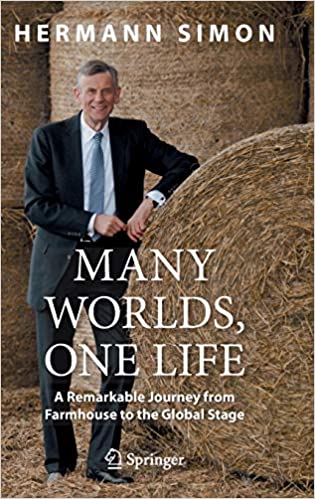
Hermann Simon, Founder and Honorary Chairman, Simon-Kucher & Partners, and author of the recent book Many Worlds, One Life: A Remarkable Journey from Farmhouse to the Global Stage, is one of the most fascinating people I’ve encountered in the Peter Drucker-related world. He was a friend of Drucker’s and is a respected commentator/analyst on Drucker’s life and work, besides being a world-renowned authority on pricing and marketing. He has also been a longtime presence at various Global Peter Drucker Forums. In June of this year, he was a panelist for the GPDF virtual ‘A Day of Drucker,’ an event I also participated in.
When I began in 2002 what seven years later became my first Drucker-related book, I learned of the friendship of the two men, and soon contacted Hermann for background information. We have stayed in touch off and on over the years. Hermann, who is based in Bonn, Germany, kindly sent me an inscribed copy of ‘Many Worlds.’ I plan on writing in more detail about the book in a future post, but here I focus on a topic that Hermann has treated elsewhere, the connections he has drawn between my two favorite authors: Drucker and Jorge Luis Borges, whom I have written about often.
The Drucker-Borges connection is drawn most heavily in the essay “Man of the Past, Man of the Future: A Personal Hommage,” a tribute to Drucker on his 90th birthday in November, 1999; an invitation from the Drucker School at Claremont Graduate University.
The essay also appears in the 2010 book Peter F. Drucker’s Next Management: New Institutions, New Theories and Practices, edited by Winfried W. Weber and Gladius Kulothungan, and published by Verlag Sordon, in Germany. My essay “Living in More Than One World – Peter Drucker and Self-Development for Knowledge Workers” also appears in the book.
In “Man of the Past…,” Hermann writes that “Drucker possesses yet another skill, which I have observed to such a great extent only in the Argentine writer Jorge Luis Borges: the skill of association. Borges seems not only to have read everything, but he also has the skill of making the most improbable connections and associations. In doing this, he surpasses time and space and recognizes relationships and analogies that escape the average person. The same is true for Peter Drucker. He draws parallels and recognizes commonalities between current, future and historical developments, stretching broad intellectual arches between them. Personalities such as Drucker [a]nd Borges seem to have encyclopedic memories.” This section was also adapted in Hermann’s October 11, 2016 Harvard Business Review essay “Why Peter Drucker’s Writing Still Feels So Relevant.”
In my August 28, 2013 post “7 Self-Management Secrets of Jorge Luis Borges,” the seven points that I noted about Borges each pertain, in varying degrees, to Peter Drucker and Hermann Simon: 1. Variety of Creative Output 2. Variety of Occupations 3. Specialization 4. Intellectual Curiosity 5. Global Worldview 6. Personal Branding 7. Brilliant Marketing.
Hermann writes in Many Worlds…about how he first came to know Drucker, and how the relationship developed. In particular, he examines Drucker’s thought in terms of his early 20th century European upbringing and ability to draw from so many different subjects and personal interests in his books, articles, teaching, and consulting.
“Because Peter Drucker understood history as few others do,” Hermann writes, “he could peer into the future in his own unique way. He repeatedly impressed me with his detailed and extensive knowledge, and how he cleverly made unusual associations.” He further elaborates that “Drucker also possessed the skill of bi-sociation, the ability to make connections between seemingly disparate things. He transcended time and space and recognized relationships and analogies that escape the average person.”
What he modestly does not mention is that his own mind works that way as well, which I believe is a major reason he won Drucker’s respect and friendship. Another commonality is that he, Drucker, and Borges were also highly successful professors, in addition to their other work and writing.
Through the Claremont Colleges Digital Library and the Drucker Archives, you can also view an incisive 2002 video interview with Hermann, in which he discusses these connections in greater detail, including the references to Borges.
Although Hermann Simon does not have the widespread name recognition of Drucker or Borges, he is a significant presence in the global management and marketing worlds. Besides the accomplishments noted above, in 2019 he was named to the Thinkers50 Hall of Fame. The mega-successful management author James Clear (Atomic Habits), summarized on his website Hermann’s 2015 book Confessions of the Pricing Man. Earlier this year, The Hermann Simon Business School opened in Shouguang, in China’s Shandong Province, giving him something else in common with Drucker, a school named after him.
Many Worlds, One Life: A Remarkable Journey from Farmhouse to the Global Stage shows Hermann Simon to be a polymath of the highest order, another attribute in common with Drucker and Borges. Indeed, the first words of Chapter 15 are: “Life is a never-ending school.”
